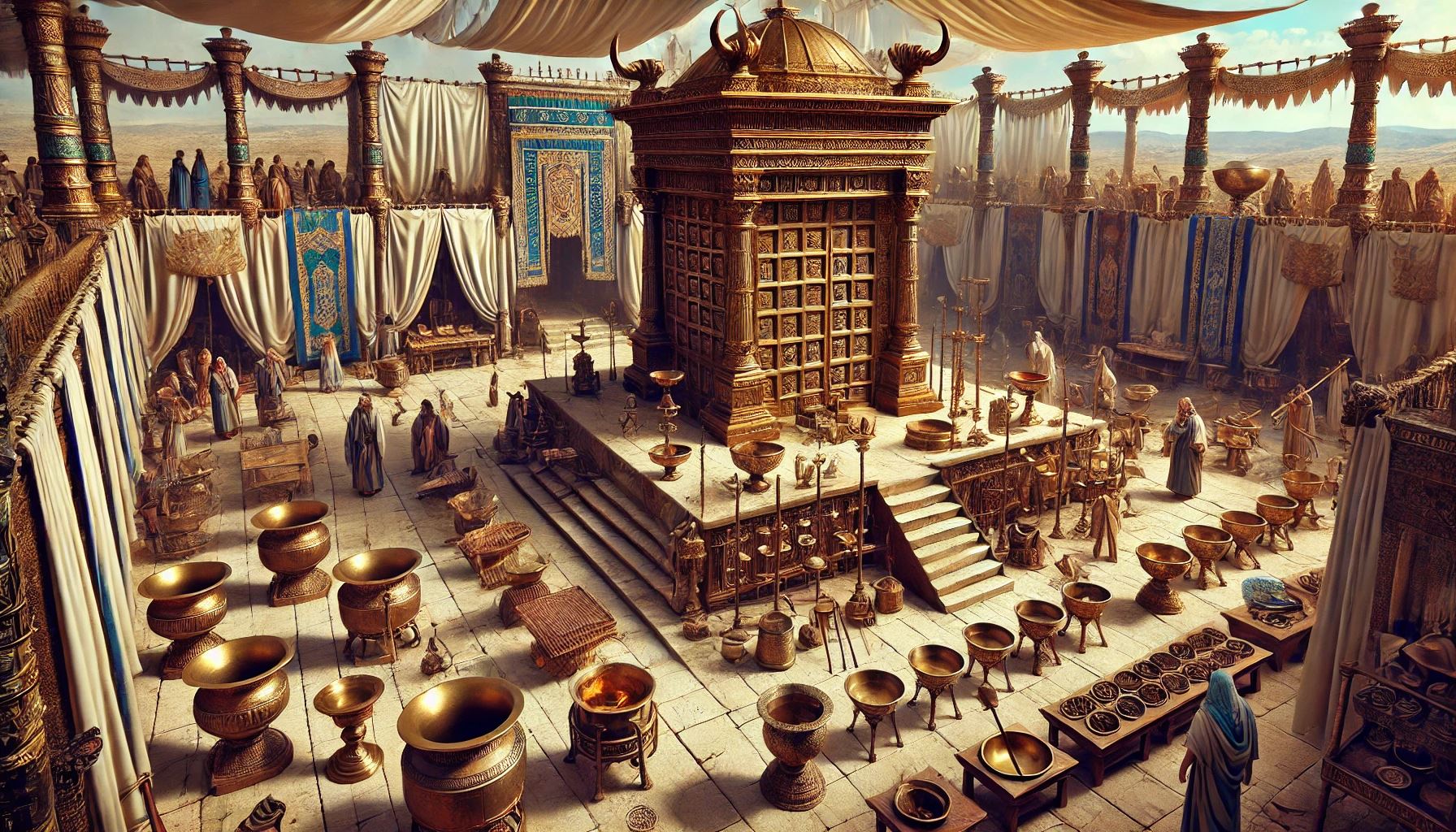
📅 July 13, 2025
📖 DAILY BIBLE READING
✨ Exodus 38 – Holy Craftsmanship – From People for God
⛺ Visible Devotion to an Invisible God
══════════════════════════════════════════════
📜 Bible Text – Exodus 38 (KJV)
1 And he made the altar of burnt offering of shittim wood: five cubits was the length thereof, and five cubits the breadth thereof; it was foursquare; and three cubits the height thereof.
2 And he made the horns thereof on the four corners of it; the horns thereof were of the same: and he overlaid it with brass.
3 And he made all the vessels of the altar, the pots, and the shovels, and the basons, and the fleshhooks, and the firepans: all the vessels thereof made he of brass.
4 And he made for the altar a brasen grate of network under the compass thereof beneath unto the midst of it.
5 And he cast four rings for the four ends of the grate of brass, to be places for the staves.
6 And he made the staves of shittim wood, and overlaid them with brass.
7 And he put the staves into the rings on the sides of the altar, to bear it withal; he made the altar hollow with boards.
8 And he made the laver of brass, and the foot of it of brass, of the lookingglasses of the women assembling, which assembled at the door of the tabernacle of the congregation.
9 And he made the court: on the south side southward the hangings of the court were of fine twined linen, an hundred cubits:
10 Their pillars were twenty, and their brasen sockets twenty; the hooks of the pillars and their fillets were of silver.
11 And for the north side the hangings were an hundred cubits, their pillars were twenty, and their sockets of brass twenty; the hooks of the pillars and their fillets of silver.
12 And for the west side were hangings of fifty cubits, their pillars ten, and their sockets ten; the hooks of the pillars and their fillets of silver.
13 And for the east side eastward fifty cubits.
14 The hangings of the one side of the gate were fifteen cubits; their pillars three, and their sockets three.
15 And for the other side of the court gate, on this hand and that hand, were hangings of fifteen cubits; their pillars three, and their sockets three.
16 All the hangings of the court round about were of fine twined linen.
17 And the sockets for the pillars were of brass; the hooks of the pillars and their fillets of silver; and the overlaying of their chapiters of silver; and all the pillars of the court were filleted with silver.
18 And the hanging for the gate of the court was needlework, of blue, and purple, and scarlet, and fine twined linen: and twenty cubits was the length, and the height in the breadth was five cubits, answerable to the hangings of the court.
19 And their pillars were four, and their sockets of brass four; their hooks of silver, and the overlaying of their chapiters and their fillets of silver.
20 And all the pins of the tabernacle, and of the court round about, were of brass.
21 This is the sum of the tabernacle, even of the tabernacle of testimony, as it was counted, according to the commandment of Moses, for the service of the Levites, by the hand of Ithamar, son to Aaron the priest.
22 And Bezaleel the son Uri, the son of Hur, of the tribe of Judah, made all that the Lord commanded Moses.
23 And with him was Aholiab, son of Ahisamach, of the tribe of Dan, an engraver, and a cunning workman, and an embroiderer in blue, and in purple, and in scarlet, and fine linen.
24 All the gold that was occupied for the work in all the work of the holy place, even the gold of the offering, was twenty and nine talents, and seven hundred and thirty shekels, after the shekel of the sanctuary.
25 And the silver of them that were numbered of the congregation was an hundred talents, and a thousand seven hundred and threescore and fifteen shekels, after the shekel of the sanctuary:
26 A bekah for every man, that is, half a shekel, after the shekel of the sanctuary, for every one that went to be numbered, from twenty years old and upward, for six hundred thousand and three thousand and five hundred and fifty men.
27 And of the hundred talents of silver were cast the sockets of the sanctuary, and the sockets of the vail; an hundred sockets of the hundred talents, a talent for a socket.
28 And of the thousand seven hundred seventy and five shekels he made hooks for the pillars, and overlaid their chapiters, and filleted them.
29 And the brass of the offering was seventy talents, and two thousand and four hundred shekels.
30 And therewith he made the sockets to the door of the tabernacle of the congregation, and the brasen altar, and the brasen grate for it, and all the vessels of the altar,
31 And the sockets of the court round about, and the sockets of the court gate, and all the pins of the tabernacle, and all the pins of the court round about.
══════════════════════════════════════════════
🔵 Introduction
In Exodus chapter 38, we encounter a detailed description of the outer courtyard and the items used for worship. What may seem like a technical blueprint or an inventory list at first glance actually reveals deep spiritual principles: obedience, devotion, purity, and the beauty of order in service to God. Every number, every material, every shape had meaning—not just back then, but still today.
══════════════════════════════════════════════
🟡 Commentary
1.The Altar of Burnt Offering and Its Utensils (vv. 1–7)
Made of acacia wood and overlaid with bronze—strong, fire-resistant, durable. It was the place where sin offerings were made. The horns represented strength and protection. All the utensils—shovels, forks, pans—were essential for the practical sacrificial service.
Meaning: The altar was the first thing a person saw when entering the sanctuary. It marked the beginning of an encounter with God—through a sacrifice.
2.The Basin Made from Mirrors (v. 8)
The basin for washing was made from women’s mirrors—a powerful symbol: vanity surrendered so cleansing could take place.
Meaning: Cleansing comes before service. Priests washed hands and feet before ministering. We too are called to spiritual purity.
3.The Courtyard and Its Dimensions (vv. 9–20)
The courtyard was orderly, symmetrical, clearly structured. Pillars, linen curtains, hooks—everything had size, shape, color, and significance. The entrances were decorated with purple and scarlet—colors of dignity and sacrifice.
Meaning: God’s presence is holy. The order and beauty of the courtyard invited worship—but also reverence.
4.The Material Accounting (vv. 21–31)
Gold, silver, and bronze were carefully listed. Every shekel counted. Bezalel and Oholiab were appointed—not just for their skill, but in obedience to God’s command.
Meaning: God is a God of order. Every contribution was valued. Every gift had a place in God’s work.
══════════════════════════════════════════════
🟢 Summary
Exodus 38 shows how precise, dedicated craftsmanship becomes a holy space. Some gave, others built, others served within it. All of it served one purpose: to make God’s glory visible and prepare a way for people to approach Him.
══════════════════════════════════════════════
📢 Message for Us Today
Even today, God is building a sanctuary—not of wood, bronze, or silver, but of people (see 1 Corinthians 3:16). Each of us is a “living stone” in God’s spiritual house. Our gifts, our time, our purity, our obedience—all are needed in the service of the living God.
God sees every “shekel” of your heart.
══════════════════════════════════════════════
💡 Reflection Questions
Where am I like the women who gave up their mirrors—willing to trade vanity for purity?
Am I building God’s work—with devotion, obedience, and precision?
Is my daily life a reflection that I am a “living courtyard” for God’s presence?
~~~~~⛺~~~~~
📆 July 13 – 19, 2025
📆 WEEKLY SPIRIT OF PROPHECY READING
📖 Ellen G. White │ Patriarchs and Prophets – Chapter 17
✨ Jacob’s Flight and Exile
📖 Read online here
══════════════════════════════════════════════
🔵 Introduction
Jacob does not leave his home as a hero, but as a fugitive—not because of external enemies, but because of inner guilt. And yet, on this very path—full of fear, uncertainty, and self-doubt—God’s faithfulness is revealed in a remarkable way. Chapter 17 of Patriarchs and Prophets vividly describes how God, despite guilt and flight, not only forgives His servant but uses him to fulfill His promises.
══════════════════════════════════════════════
🟡 Commentary
📌 1. Jacob flees – alone, afraid, and broken
Jacob leaves his parents’ home out of fear of Esau’s wrath.
He is filled with guilt and remorse, feeling abandoned—by his family and perhaps even by God.
In this solitude, he begins to pray honestly. His prayer is not prideful, but marked by humility and desperation.
📌 2. Heaven opens – the ladder from heaven (Genesis 28)
In a dream, Jacob sees a ladder connecting heaven and earth.
Angels ascend and descend—a picture of God’s service to us.
God Himself stands above the ladder and repeats the promise made to Abraham—now it applies to Jacob!
Jacob not only receives assurance but also a promise: “I am with you… I will not leave you.”
📌 3. Jacob awakens – from sinner to worshiper
Jacob realizes: “Surely the Lord is in this place, and I did not know it!”
He sets up a stone pillar, names the place Bethel (“House of God”), and makes a vow—not as a bargain, but out of gratitude.
He vows to remain faithful, to give a tenth, and to follow God.
📌 4. Jacob in Haran – faithful despite disappointment
In Haran, Jacob meets his future wife Rachel.
He serves seven years—out of love, faithfully and patiently.
But Laban deceives him. Instead of Rachel, he is given Leah.
Jacob is betrayed—yet he stays.
In total, he serves 20 years, is cheated multiple times, but God blesses him despite all human injustice.
📌 5. The return – decision in distress
Jacob realizes it’s time to return home.
He prays again—remembering God’s promise at Bethel.
God answers: “Return… I am with you.”
Laban pursues him—but God protects Jacob.
A peace covenant is made, marked with the name Mizpah – “The Lord watch between you and me.”
══════════════════════════════════════════════
🟢 Summary
Jacob begins his journey as a fugitive burdened by guilt, fear, and uncertainty. But God meets him—not with punishment, but with grace. On the difficult road into exile, Jacob grows spiritually, is shaped through trials, and ultimately remains faithful to God. A deceiver becomes a shepherd, a father, and a bearer of the promise.
══════════════════════════════════════════════
📢 Message for Us Today
We too experience times of guilt, loneliness, and uncertainty. We may feel like failures, misunderstood, or taken advantage of. But God does not abandon us.
It is often in the deepest valleys that He reveals His faithfulness.
Jacob’s story shows us:
-
God starts new journeys with broken people.
-
Your past does not determine your calling.
-
God is faithful to His promises—even when we fail.
══════════════════════════════════════════════
💬 Reflection Question
-
Have I ever encountered God like Jacob—in the midst of crisis?
-
What is my “Bethel”? Where has God shown me His presence?
-
Am I ready, like Jacob, to entrust God with my life, my gifts, and my tithe?
-
What do I need to let go of today in order to follow God’s call to return?





















